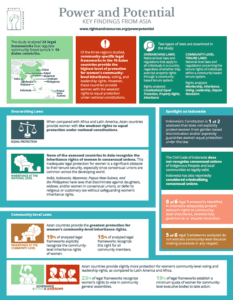Prior to the introduction of oil palm in East Kalimantan, Indonesia, women in the village of Long Ayan held customary rights to their lands and resources. These rights, grounded in the community perception of women as strong and independent livelihood managers, allowed women to hold and access land largely independent of their relationships with men.
Yet the equality that some indigenous and local communities like Long Ayan in Indonesia embrace is threatened by both inadequate protections for women in national and laws and regulations, and the expansion of large-scale development and agriculture projects.
Of 30 developing countries analyzed in RRI’s “Power and Potential” report, Indonesia is one of only two countries that does not include equal protection for women in its constitution. In addition, none of the six legal frameworks regulating community forests that were analyzed in Indonesia adequately protect women’s rights to community-level inheritance, membership, governance, or dispute resolution.
Large-scale land acquisitions, driven especially by the oil palm boom, are also having profound effects on rural livelihoods and community relations. In Long Ayan, the process of incorporating the community into oil palm developments has changed community dynamics and reduced the standing of women within the community.
Companies, framing oil palm as a “male industry,” persuaded male community leaders to negotiate community land acquisitions—and effectively excluded women from the decision making. As a result, some women who did not want to give up their land eventually were compelled to follow the decisions of leaders and other residents.
“My land was said to be under HGU [company concession]; I felt like I didn’t want to give it up,” said one woman during an interview in September 2016. “But everyone else around us [had given] their land up. I was afraid that if we didn’t give it up they [referring to the company] will call us as stubborn and send us to jail.”
As oil palm takes over the landscape, changes to the community have been contradictory. New employment and investment opportunities have helped diversify household livelihoods, and some women have found work on plantations, despite the stated preferences for men. But these are mostly short-term economic opportunities. Both equality and the community’s long-term security to access its customary lands are now challenged.
Many women who previously made their living through handicrafts are now unable to access the forest for materials they require; their livelihoods and their relationship with the forest has changed. This has especially impacted older women in the community, whose skills will not be passed on to a younger generation.
“Now we cannot take rattan from the forest anymore, there is no more forest,” said one community member in another interview. “Before, we [a group of two or three women] could get into the forest to get the rattan to make lenjung and hats. Now we have to buy the rattan.”
Additional research from two other communities in East and West Kalimantan also finds that women who are excluded from negotiations regarding large-scale land acquisitions on or near their lands lose the most. Though women may hold power and influence within their households, they are often locked out of key community-level decisions. By the time that women learn of a potential land acquisition from their husbands, community leaders (or a male-dominated community assembly) may have already committed the community’s land to an unconscionable deal that endures for generations to come.

Across the country, community women have lost their homes as well as the basis for their livelihoods; those who resist may face criminalization—legal prosecution—and violence.
Because of these challenges, women in Indonesia are increasingly placing themselves on the front lines of land rights struggles. In Jakarta, women from Kendeng community cemented their feet in front of the Presidential Palace to protest the imposition of a giant cement factory on community lands. In Seko, women have been on the front lines of a movement to resist the construction of a dam on a river that crosses their customary territory. And in March 2017, Rukka Sombolinggi, a native of the Toraja tribe, was elected as the Secretary General of the Indigenous Peoples Alliance of the Archipelago (AMAN)— the country’s largest indigenous network.
In Indonesia, women are increasingly leading indigenous and local communities, civil society organizations, and social movements. Even as women navigate the challenges brought by large-scale land acquisitions and shifting livelihoods, they are fighting back, asserting their role as managers of community forests, and helping their communities keep up with outside pressures.
